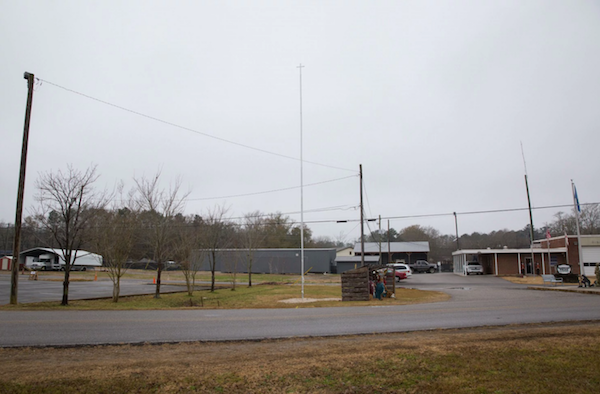
This flagpole photo accompanies the Washington Post story about the proposed Christian flag in Glencoe, Ala. (Kevin D. Lines / The Washington Post.)
The Freedom From Religion Foundation warns that an Alabama mayor’s Christian machinations are raising a constitutional red flag.
FFRF had informed the city of Glencoe two years ago that it is unconstitutional for the government to fly a Christian flag over City Hall. Glencoe Mayor Charles Gilchrist heeded FFRF’s request and removed the flag at that time. However, it has come to light that the mayor has been working to install a new 50-foot flagpole that will make it appear — intentionally — as if the flag is still being flown by the city, the Washington Post reports.
FFRF’s letter to the city’s legal counsel raises two concerns with Gilchrist’s actions. First, they might create a constitutional problem if the mayor is using city resources to install this pole and raise the Christian flag. Second, when it comes to state-church law, appearances matter. FFRF’s open records request, submitted with the letter, will help determine whether or not the mayor has overstepped.
The Post article makes it appear that it is the mayor’s plan to raise the Christian flag on church property next door to City Hall, that he dug the hole, that he directed the placement of the new flagpole, and that he stored the flag to be hoisted in his office in City Hall. It also appears as though Gilchrist selected the spot for the new flagpole, which he chose because the flag will seem to be flying over city hall even if the flagpole is technically over church property. Gilchrist mused over in the story about which elected officials he will invite to his flag-raising ceremony, adding to the appearance of city endorsement.
“This story certainly gives the impression that the mayor is working to circumvent the Establishment Clause of the First Amendment to the United States Constitution, which the Supreme Court has said time and again ‘mandates government neutrality between religion and religion, and between religion and nonreligion,'” FFRF Director of Strategic Response Andrew Seidel, a constitutional attorney, writes to the city of Glencoe’s legal counsel.
Additionally, the Supreme Court has ruled, “The Establishment Clause, at the very least, prohibits government from appearing to take a position on questions of religious belief.” The appearance of city endorsement is exacerbated because the flag was illegally flown a few feet away for years.
When government actions appear to endorse religion, the government then has an affirmative obligation to alleviate that appearance. Glencoe will have to ensure that the flagpole’s “positioning and orientation” do not “combine with the other physical features to convey the impression that the [flag] is on city park property,” to quote another federal court.
If the flagpole remains in its current placement, the city must affirmatively disclaim the message, FFRF asserts. This might include a tall, conspicuous fence to show the demarcation between city and church property; permanent signage disclaiming the flag; and some sort of public statement or advertisement to counter the impression that this is in fact a government endorsement of religion.
“According to the Post, the mayor continues to signal that only Christians count in Glencoe,” says FFRF Co-President Annie Laurie Gaylor. “But he’s the mayor of all residents and all folks there — of any religion or no religion — should feel welcome.”
The Freedom From Religion Foundation is a national nonprofit organization dedicated to protecting the constitutional principle of separation of state and church with about 30,000 nonreligious members across the country, including in Alabama.

